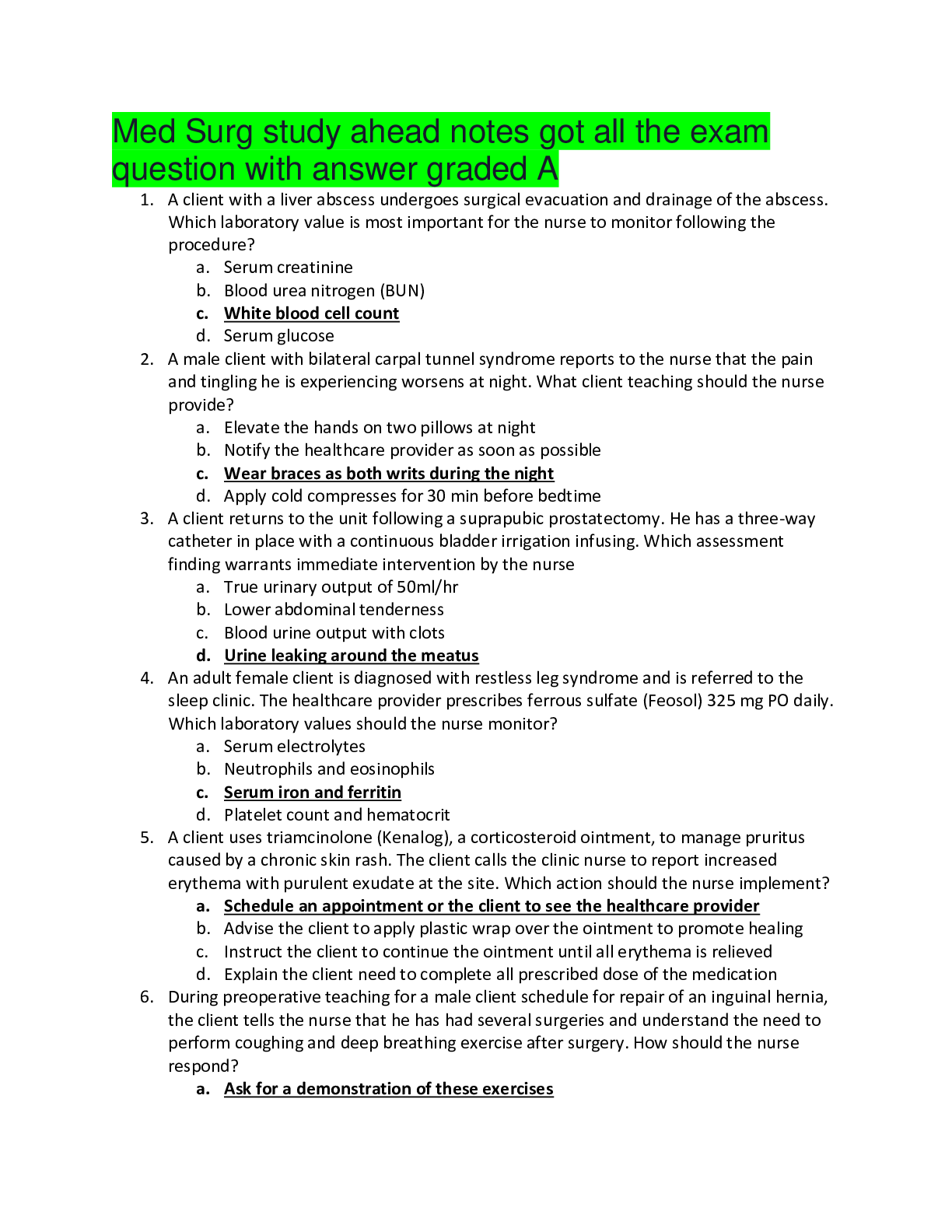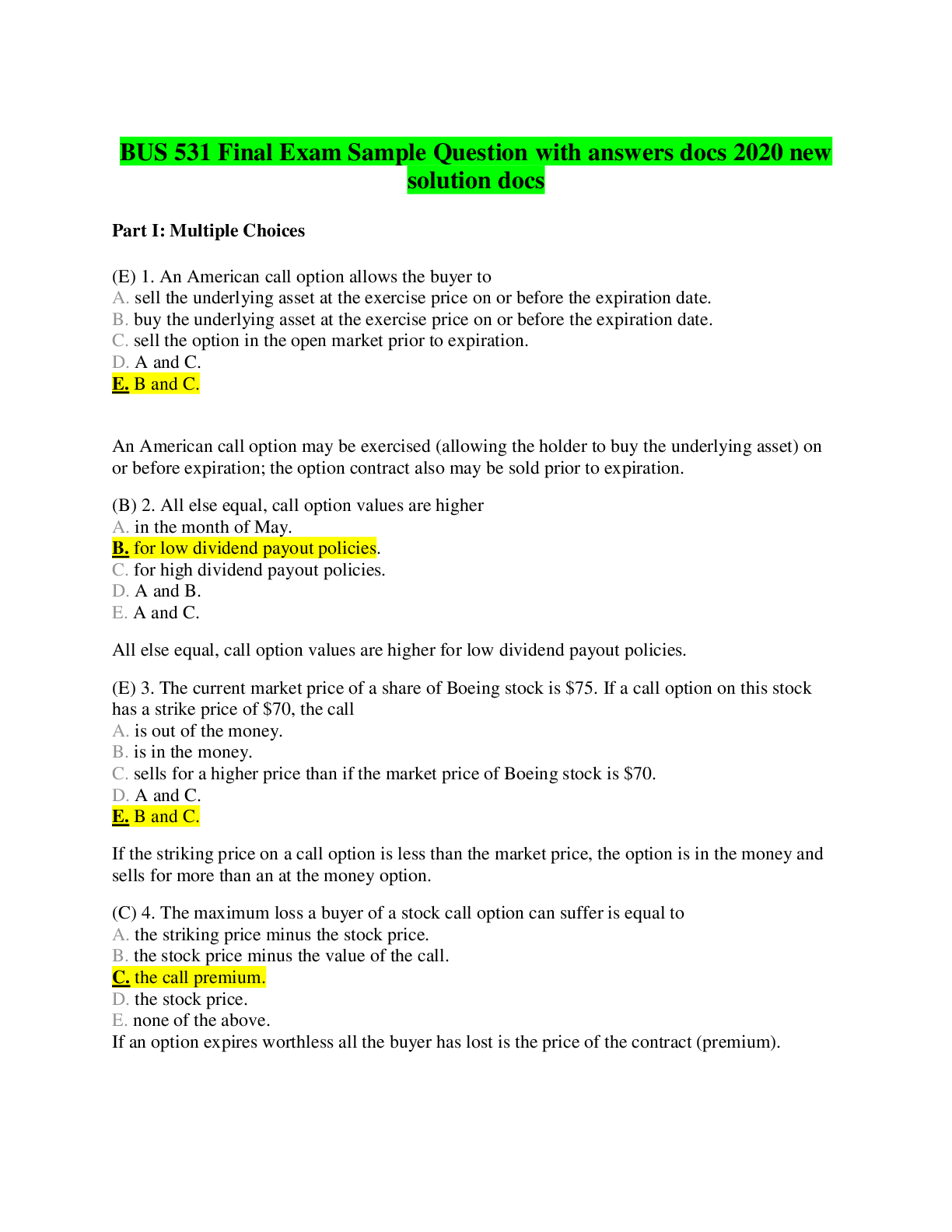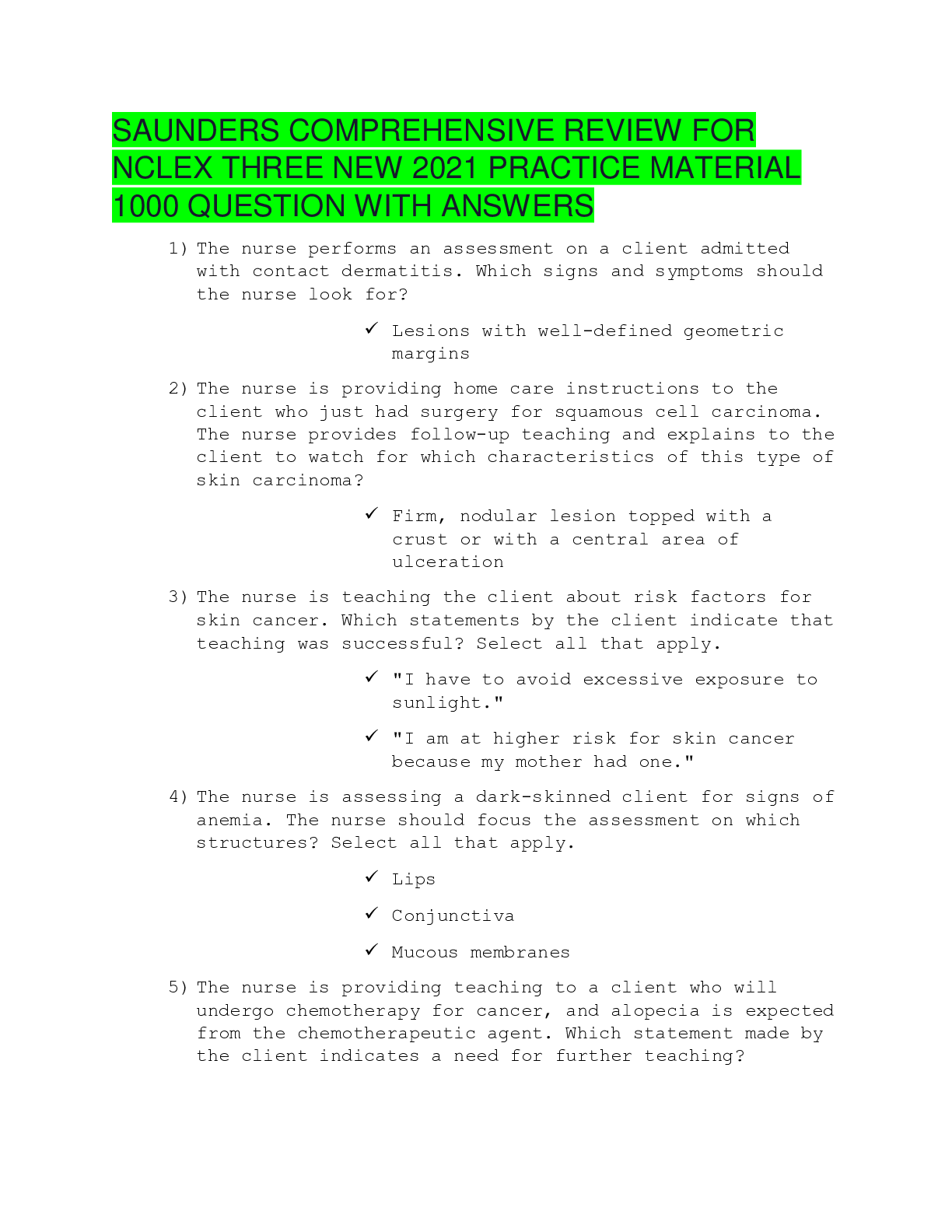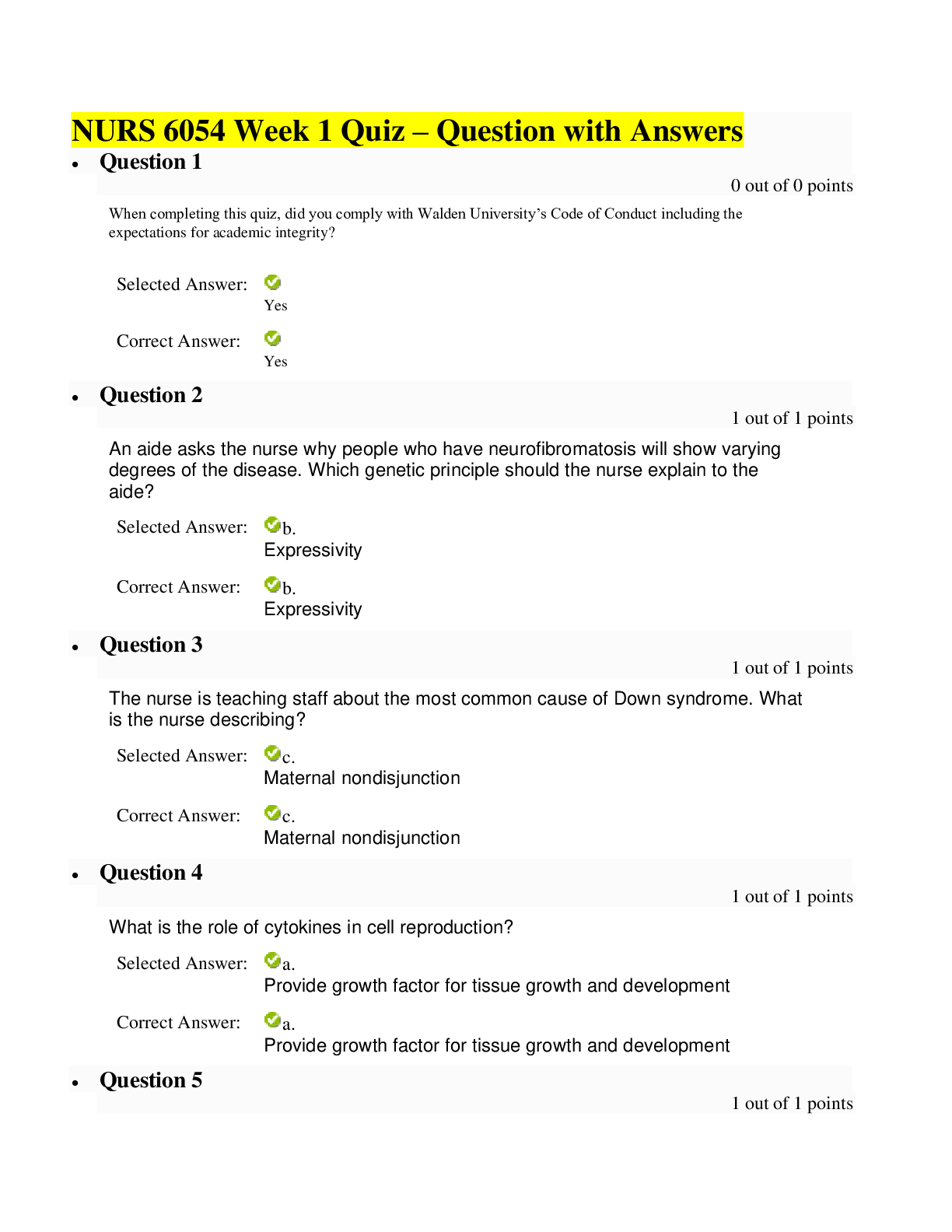Finance > QUESTIONS & ANSWERS > LIBF Unit 1, Top Exam Question with accurate answers, 100% Accurate, rated A+ (All)
LIBF Unit 1, Top Exam Question with accurate answers, 100% Accurate, rated A+
Document Content and Description Below
LIBF Unit 1, Top Exam Question with accurate answers, 100% Accurate, rated A+ Annual Budget - ✔✔-an outline, given by the Chancellor of the Exchequer, of planned government expenditure for ... the next financial year. Annual equivalent rate (AER) - ✔✔-the interest rate that would be paid on a savings account if you were to leave the money in the account for a full year. Annual percentage rate (APR) - ✔✔-the interest that would be charged on a sum borrowed over one full year; used to measure the interest rate on loans, mortgages and credit cards; the calculation includes the fees that lenders charge automatically on the product, so that it gives a clear picture of the cost. Asset - ✔✔-anything that a person owns that has a monetary value, such as a house, car, stereo, jewellery and so on. Austerity - ✔✔-a government measure to reduce the amount of money it spends (usually reduced wages and benefits), resulting in difficult financial conditions for a population. Bad debt - ✔✔-debt that can never be paid off. Bank rate - ✔✔-the official interest rate as set by the Bank of England. Banking industry - ✔✔-banks, buildings societies and other businesses that offer financial products and services; part of the private sector. Barter - ✔✔-the exchange of goods and services for payment of other goods and services without using money. Basket of goods - ✔✔-the representative items that a household buys over a period of time on which inflation calculations are based. Benefits - ✔✔-(1) money and other financial support (such as reduced bus and train fares or provision of housing) that the government provides for people who are unable to get any other income; (2) payments that the government makes to someone who is entitled to receive them (eg Jobseeker's Allowance). Bill - ✔✔-a law that has been passed. Birth rate - ✔✔-the numbers of children born in a year, compared to the population total. Bonds - ✔✔-a certificate that shows you have bought the debt from a company or the government, in return for which the company or government pays a fixed amount of money in interest each year. Budget - ✔✔-a plan for how you will use your income, including spending and saving. Bureau de change - ✔✔-a business that deals in currency exchange. Cabinet - ✔✔-a committee of senior government ministers who are responsible for setting government policy. Capacity building - ✔✔-making local communities self-sustaining. Capital - ✔✔-the money with which a business starts or the original amount of debt taken out. Capital gains tax - ✔✔-a tax on the increase in value of an asset, such as land or shares. Cash - ✔✔-banknotes and coins. Cash flow - ✔✔-all of your money coming in and money going out. Cashless society - ✔✔-a social system in which no cash is used to pay for goods and services. Charity - ✔✔-(1) an organisation set up to help a particular group or issue; (2) the act of donating money or time to a cause. Charity sector - ✔✔-charities and other non-government organisations that are run not for profit, but for the good of society. Coalition - ✔✔-when two or more political parties join together to form a majority in Parliament because neither of them could do so by themselves. Commission - ✔✔-an amount charged by currency exchange services as a flat fee for the service of buying or selling foreign currencies. Communist economy - ✔✔-a type of market economy in which government makes all of the decisions. Commuter belt - ✔✔-an area just outside a city, in which people live and from which they travel into the city to work each day. Compound interest - ✔✔-interest that is calculated on the principal plus the interest that has been charged or paid so far. Consequences - ✔✔-the outcome or result of a given event or action. Constitutional monarchy - a system of government in which a king or queen is the head of state and an elected body makes the laws. Consumer - ✔✔-someone who uses or buys goods and services. Consumer Prices Index (CPI) - ✔✔-one of the main measures of inflation, calculated monthly by measuring the average cost of a 'basket' of goods less major household expenditure, such as mortgages and council tax. Corporate social responsibility (CSR) - ✔✔-business self-regulation that drives a company to act in an ethical manner - ie to make socially responsible decisions, such as recycling or reducing its pollution. Corporation tax - ✔✔-a tax that a business pays on its profits. Cost of living - ✔✔-the amount that you need to spend to buy the goods and services necessary for living an average life. Cost-push inflation - ✔✔-inflation that is driven by higher costs of production. Counterfeiting - ✔✔-producing an imitation (fake) of a 'real' product, with the intention of gaining (usually financially) from people not knowing the difference. Credit - ✔✔-- (1) the ability to buy goods and services before you are able to pay for them, by using money borrowed from the bank, ie using more money than you currently have; (2) money put into your current or savings account. Credit card - ✔✔-a small plastic card that allows the owner to use credit. Credit history - ✔✔-a person's previous history of debt repayments. Currency - ✔✔-the money used in a particular country. Currency broker - ✔✔-a person or business who deals in all kinds of currency exchange. Currency exchange - ✔✔-changing one currency for another; buying and selling foreign currency. Debit - ✔✔-withdrawing money from your own account, from money that you already have; not using more money than you have. Debit card - ✔✔-a small plastic card that allows someone to withdraw money that they already have available in an account. Debt - ✔✔-(1) money owed to another person or organisation such as a bank; (2) the total amount of money that someone owes at a particular point in time. Default - ✔✔-the situation in which a borrower is unable to repay a debt. Deficit - ✔✔-more expenditure than income; more money paid out than coming in. Demand-pull inflation - ✔✔-inflation that is driven by the numbers of people who want a particular item or service. Democracy - ✔✔-a system of government in which the people rule through the power to vote for their representatives. Demography - ✔✔-the study of the structure of a human population. Denomination - ✔✔-the value of money, eg the amount written on a coin or a banknote. Dependant - ✔✔-a child or other person who is financially dependent on you. Depreciation - ✔✔-the situation in which an asset or money decreases in value. Devaluation - ✔✔-the situation in which the value of something goes down. Devolution - ✔✔-when particular political powers are given to a smaller subsection of the nation - for example, in the UK some powers have been transferred to Scotland, Wales and Northern Ireland. Direct debit - ✔✔-an arrangement made with the bank to pay a company the amount of money they request from your bank account, in payment for goods or services; often used to pay bills. Direct tax - ✔✔-tax that is taken directly from income or wealth. Disposable income - ✔✔-the part of your income that you can choose to use in whatever way you want, after you have paid all of your essential expenses. There are technical definitions for 'disposable' and 'discretionary' income, but you do not need to know these distinctions at this level of study. Earnings - ✔✔-the money that you make from your job. Economic cycle - ✔✔-the regular up-and-down movement of the economy. Economic downturn - ✔✔-a period during which economic activity slows down, potentially leading to a recession. Economic growth - ✔✔-a situation in which the economy is expanding, as measured by increasing national income, low [Show More]
Last updated: 1 year ago
Preview 1 out of 19 pages
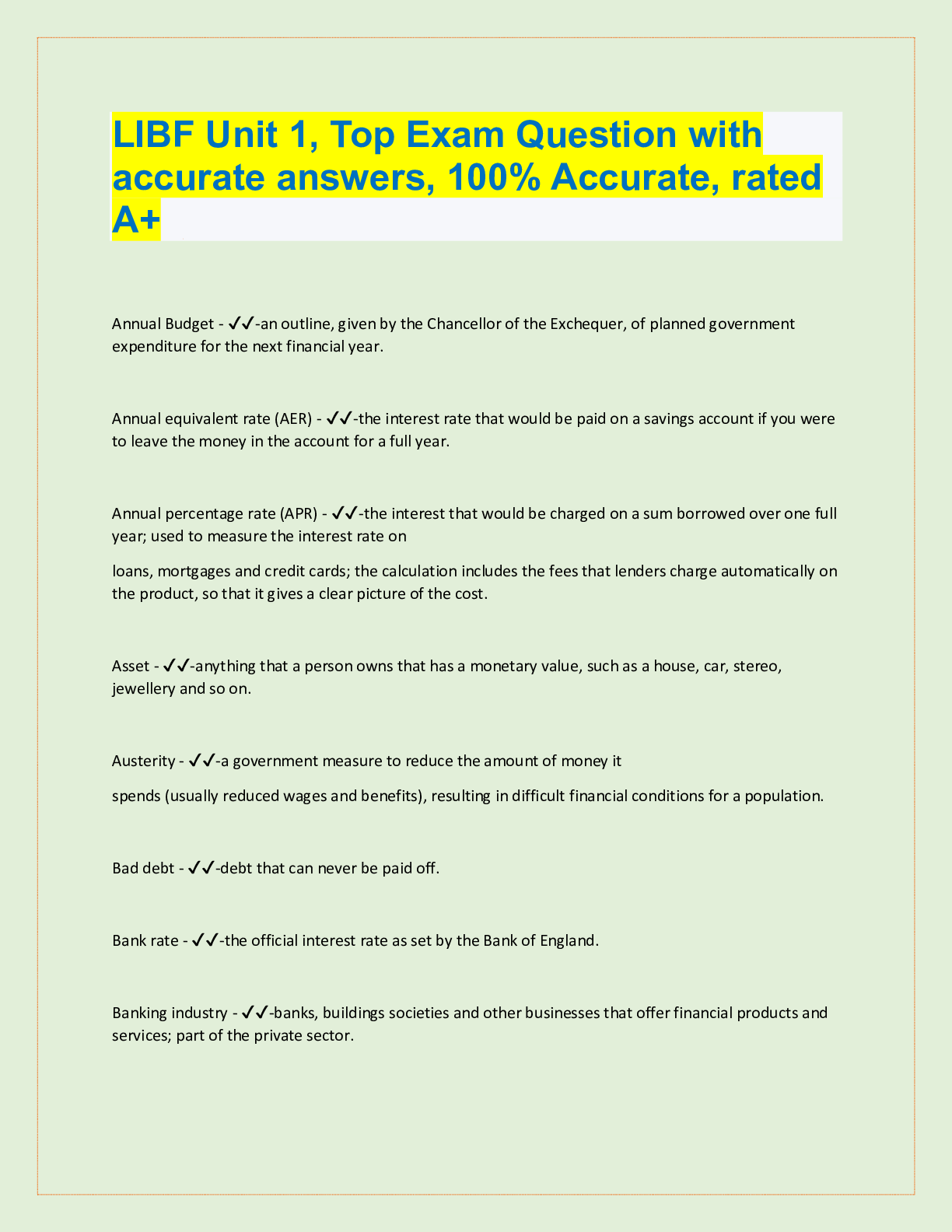
Buy this document to get the full access instantly
Instant Download Access after purchase
Add to cartInstant download
We Accept:

Also available in bundle (1)
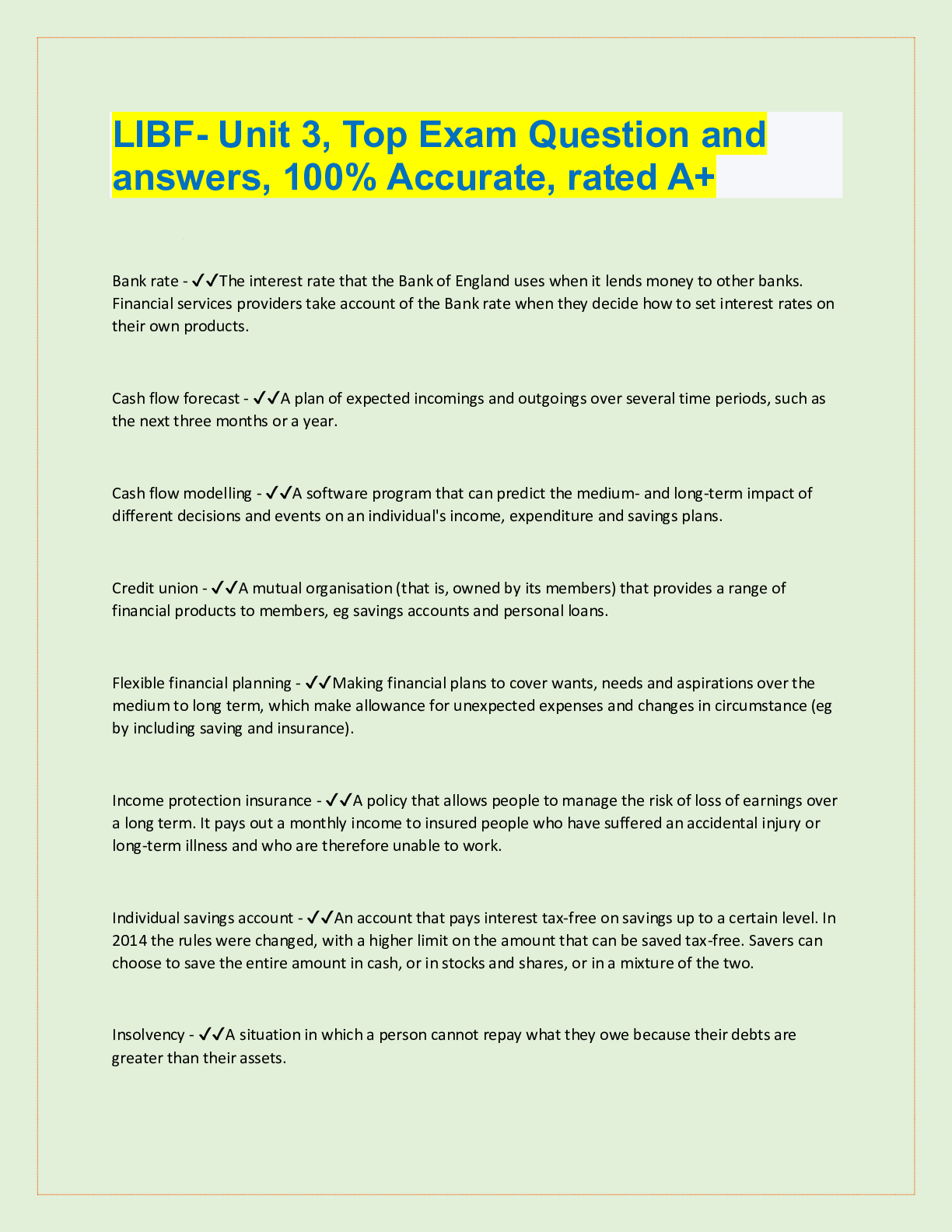
LIBF Exam Bundle, Examinable Questions ( Answered)
LIBF revision. All units , Exam Questions and answers, 100% Accurate, rated A+. Easy revision and mastery.
By Topmark 1 year ago
$35
15
Reviews( 0 )
$11.00
Document information
Connected school, study & course
About the document
Uploaded On
Mar 14, 2023
Number of pages
19
Written in
Additional information
This document has been written for:
Uploaded
Mar 14, 2023
Downloads
0
Views
50

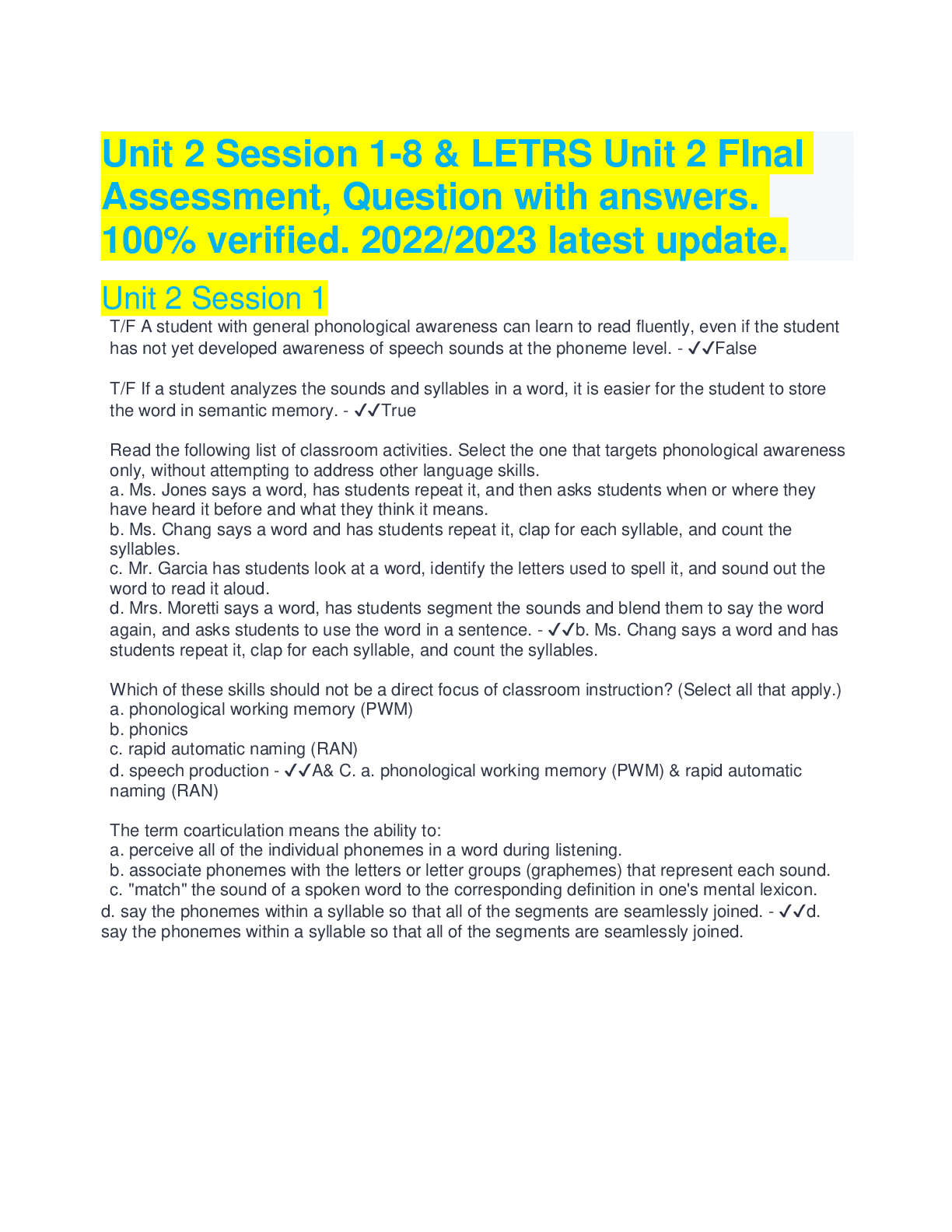
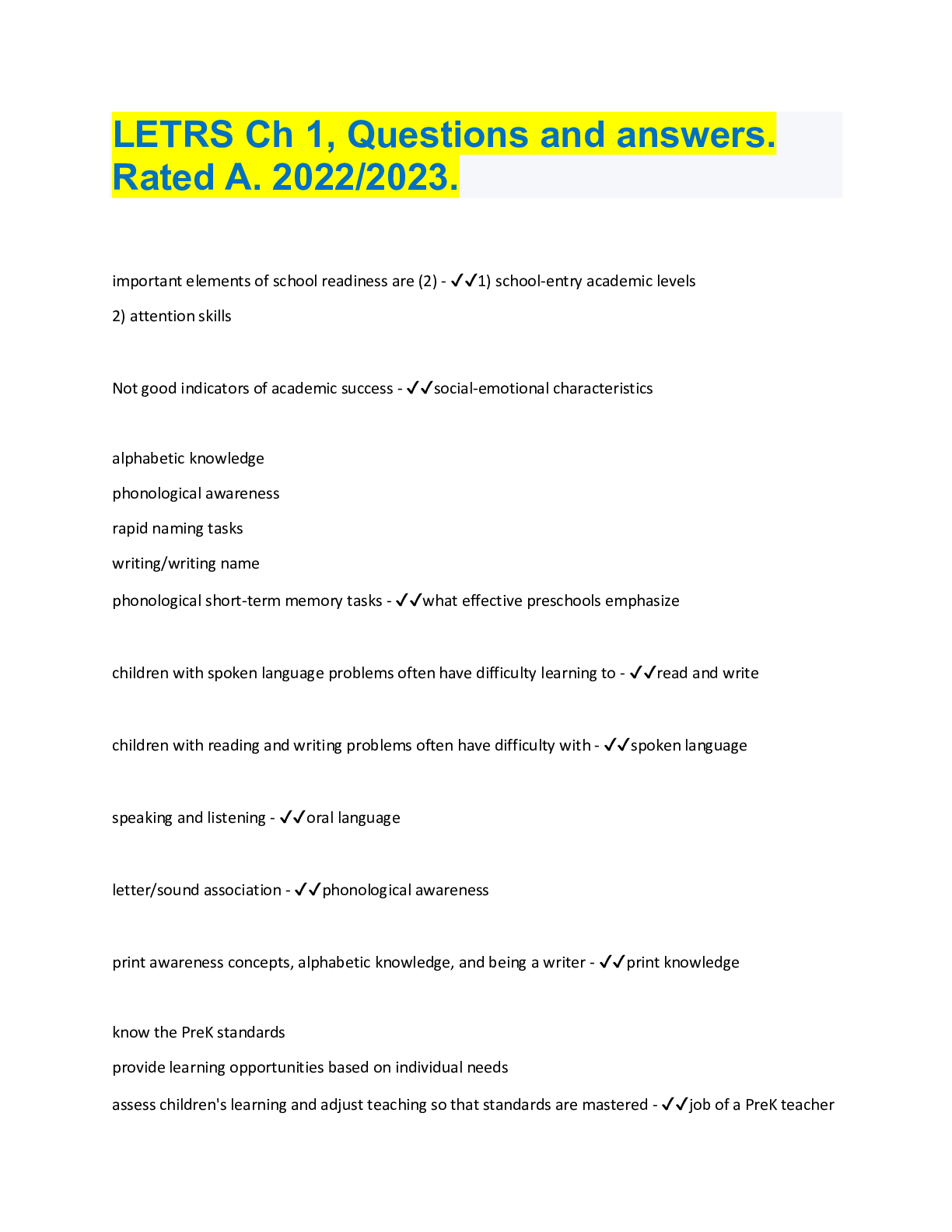
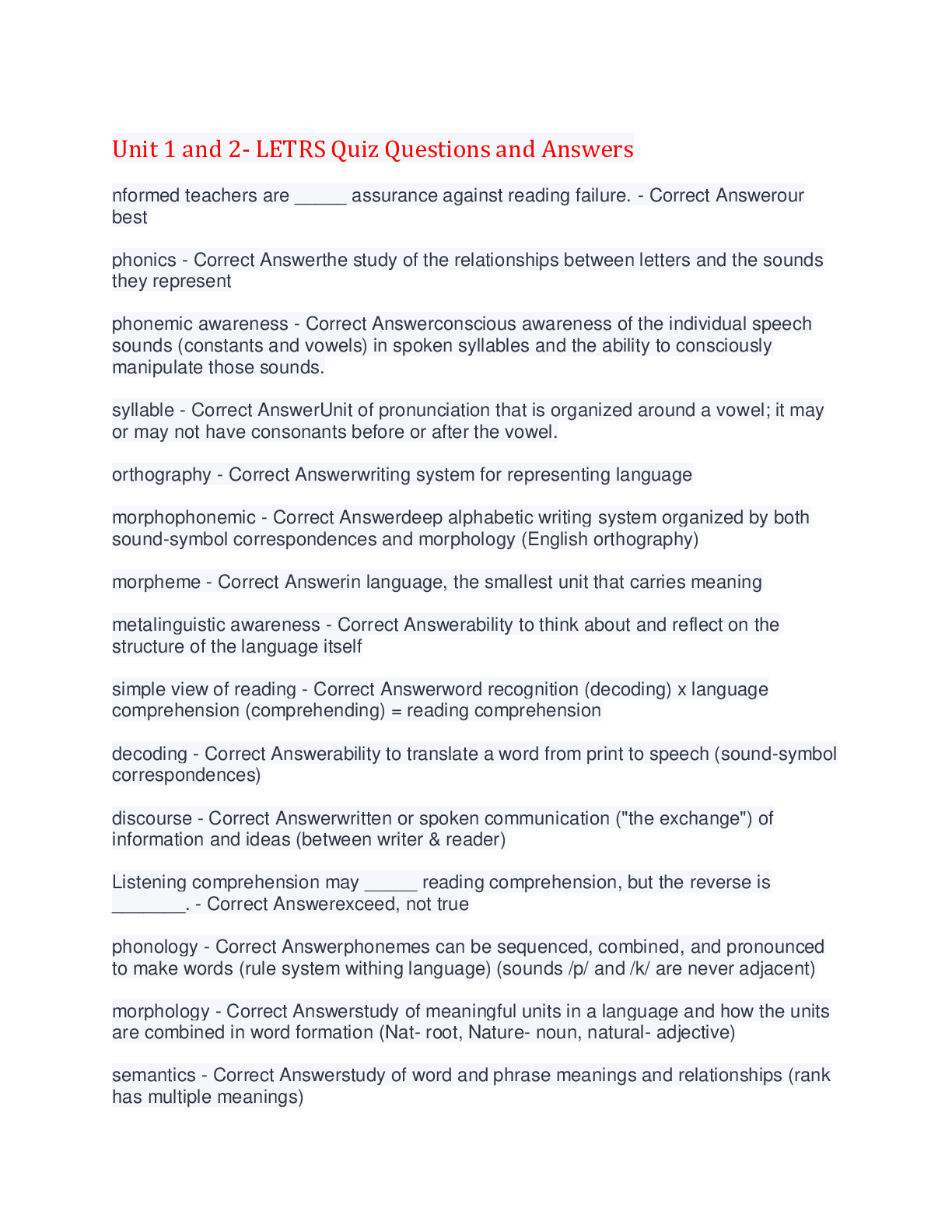
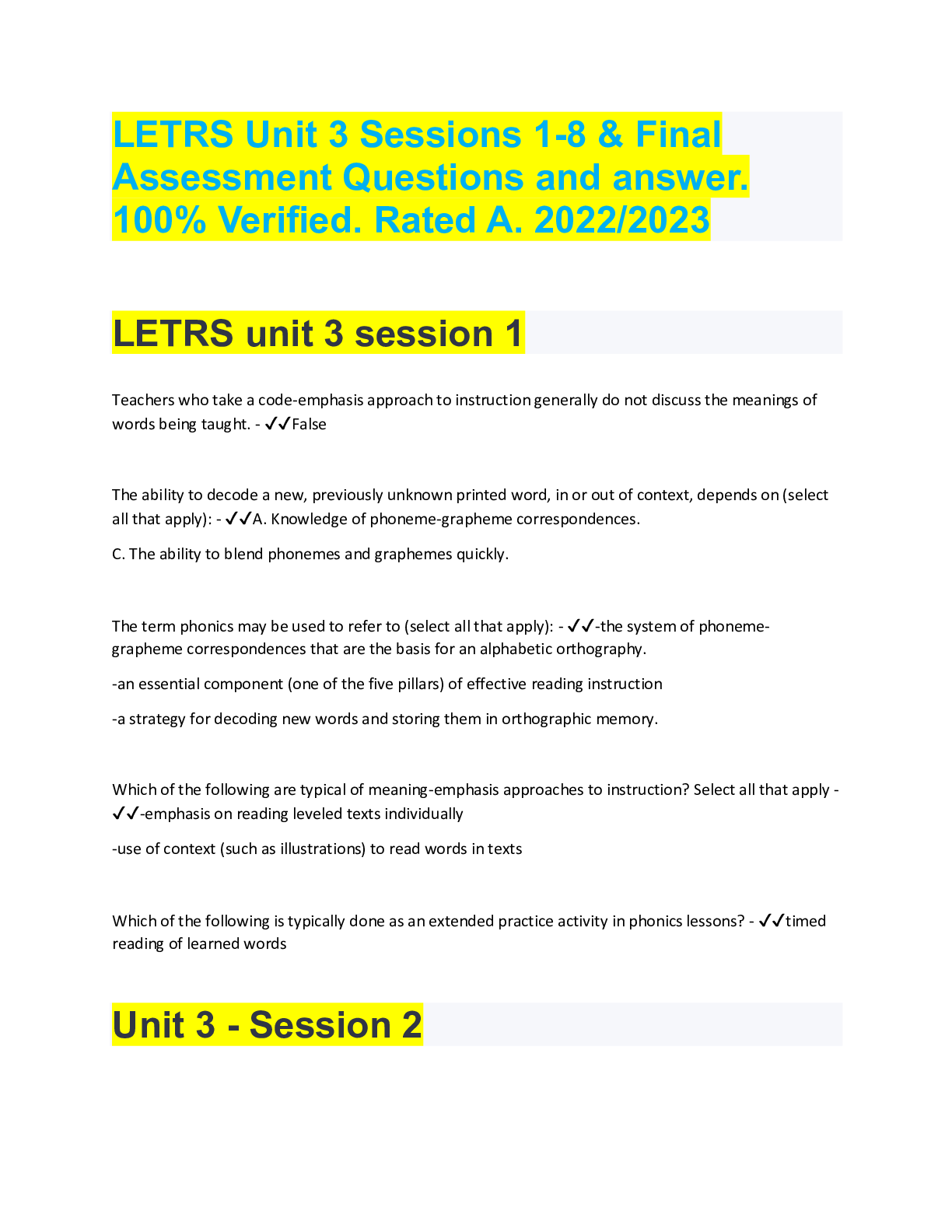

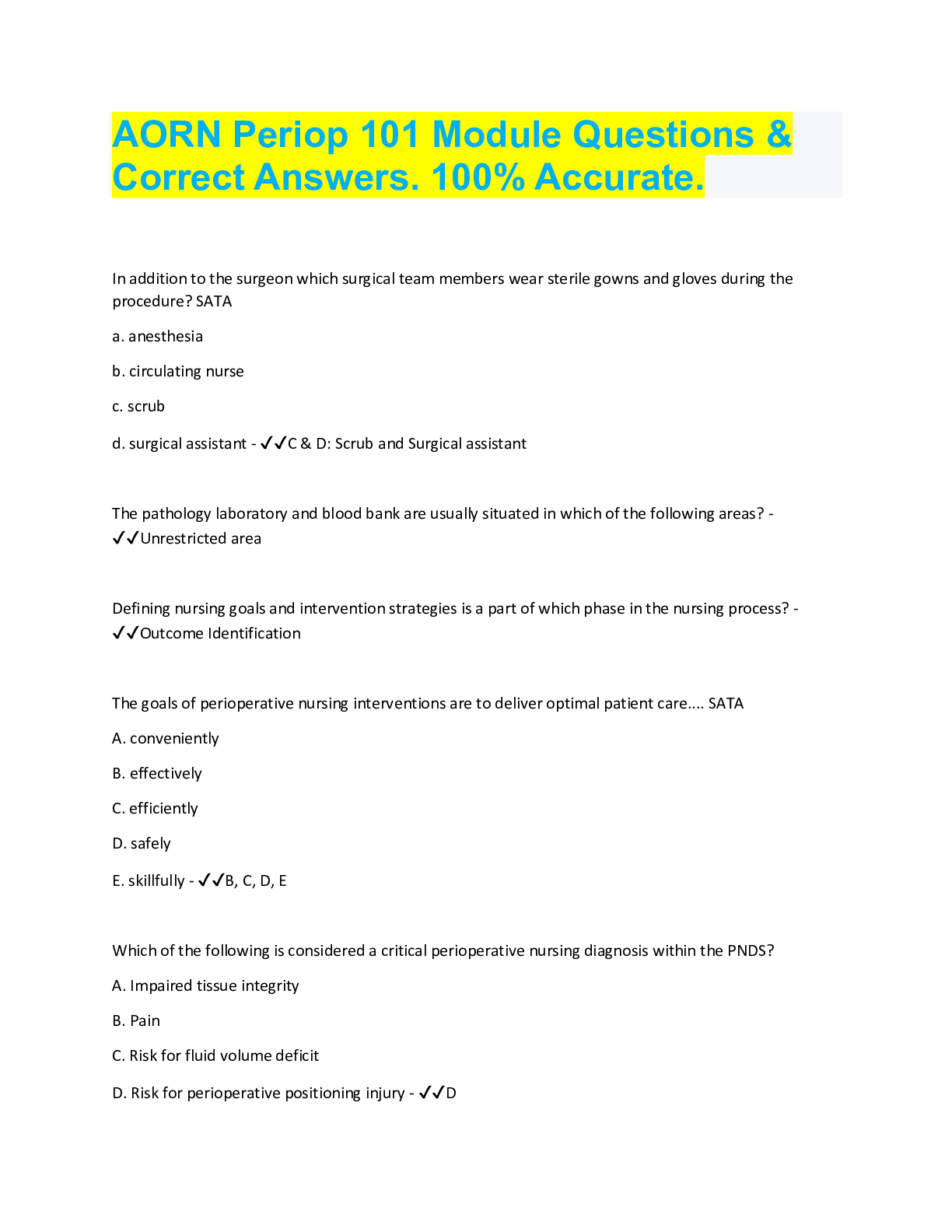
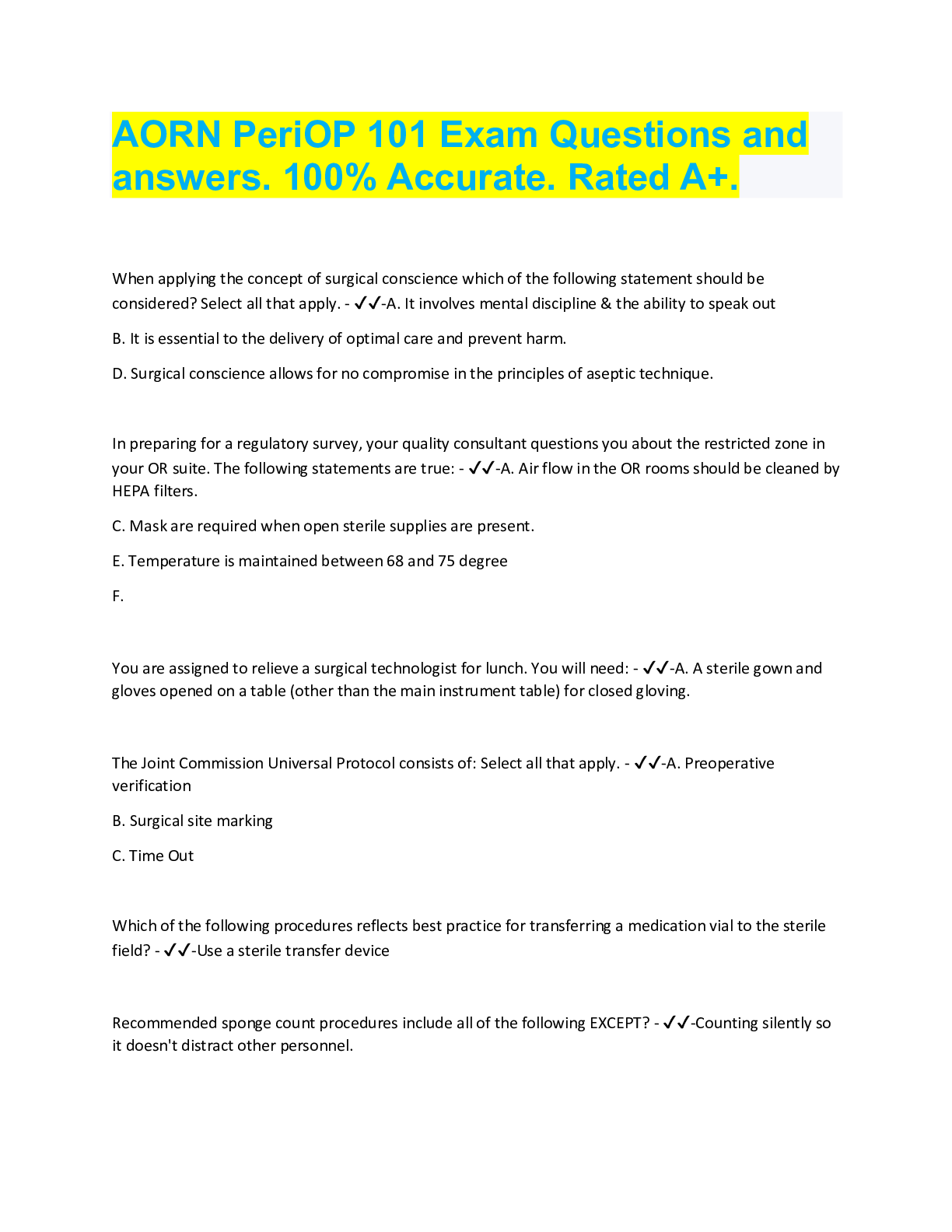
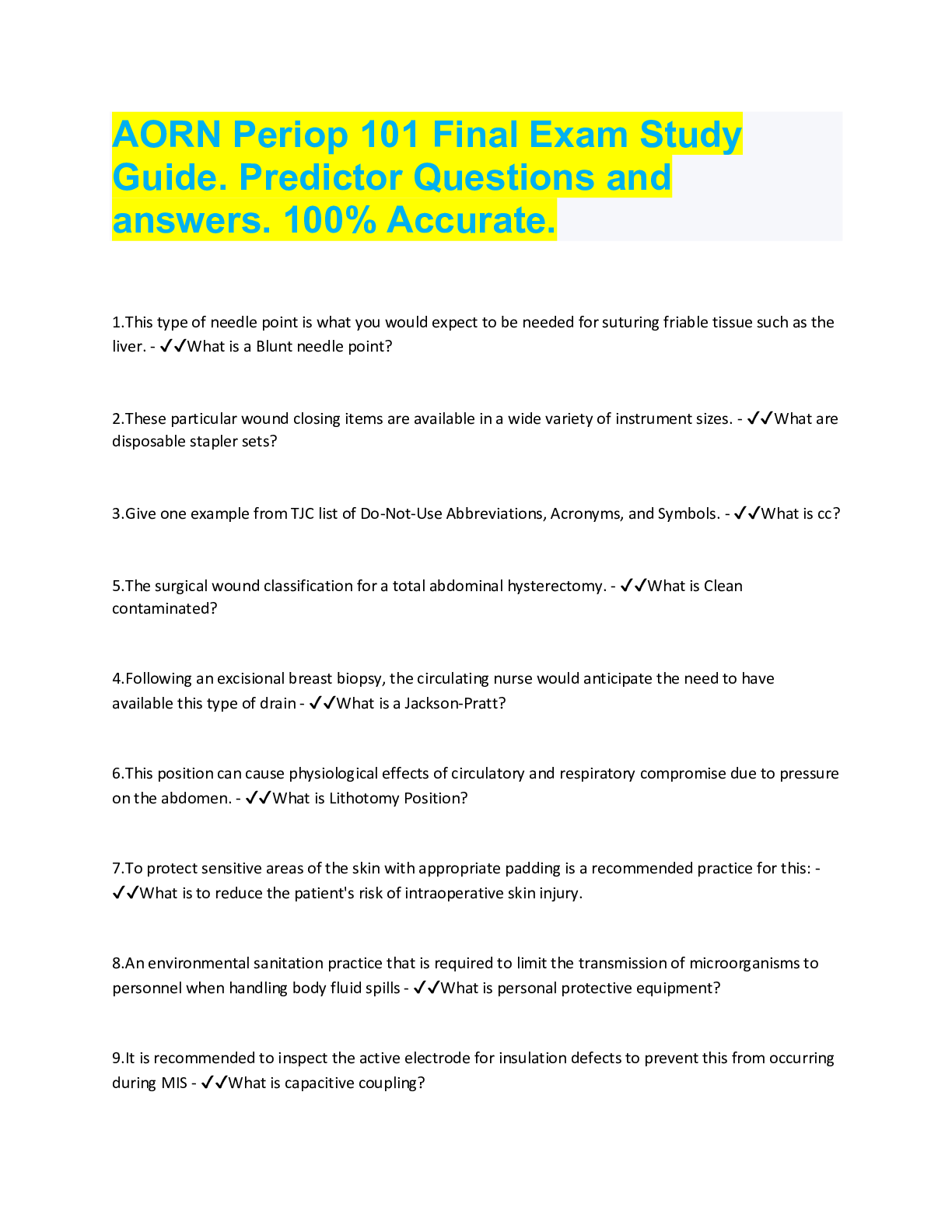
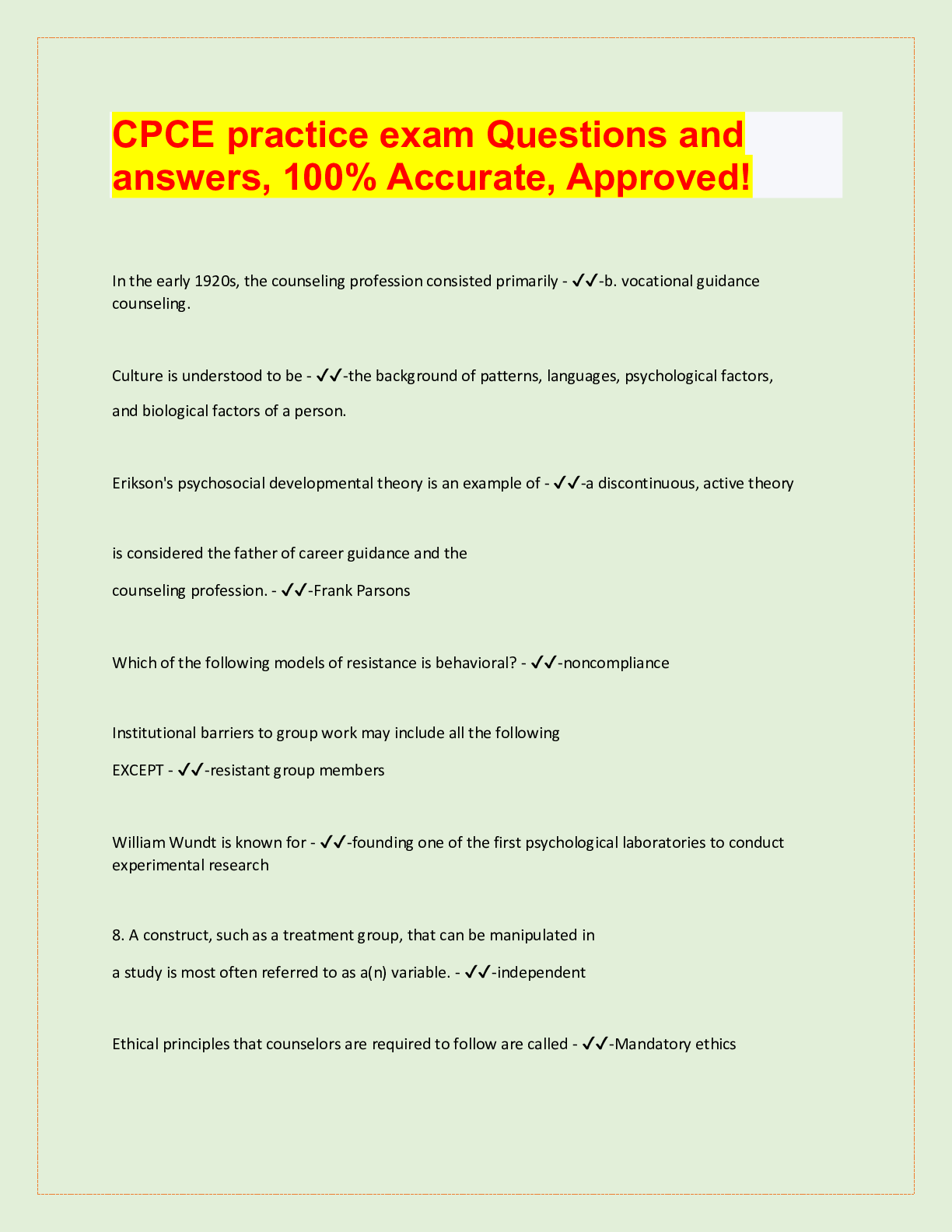


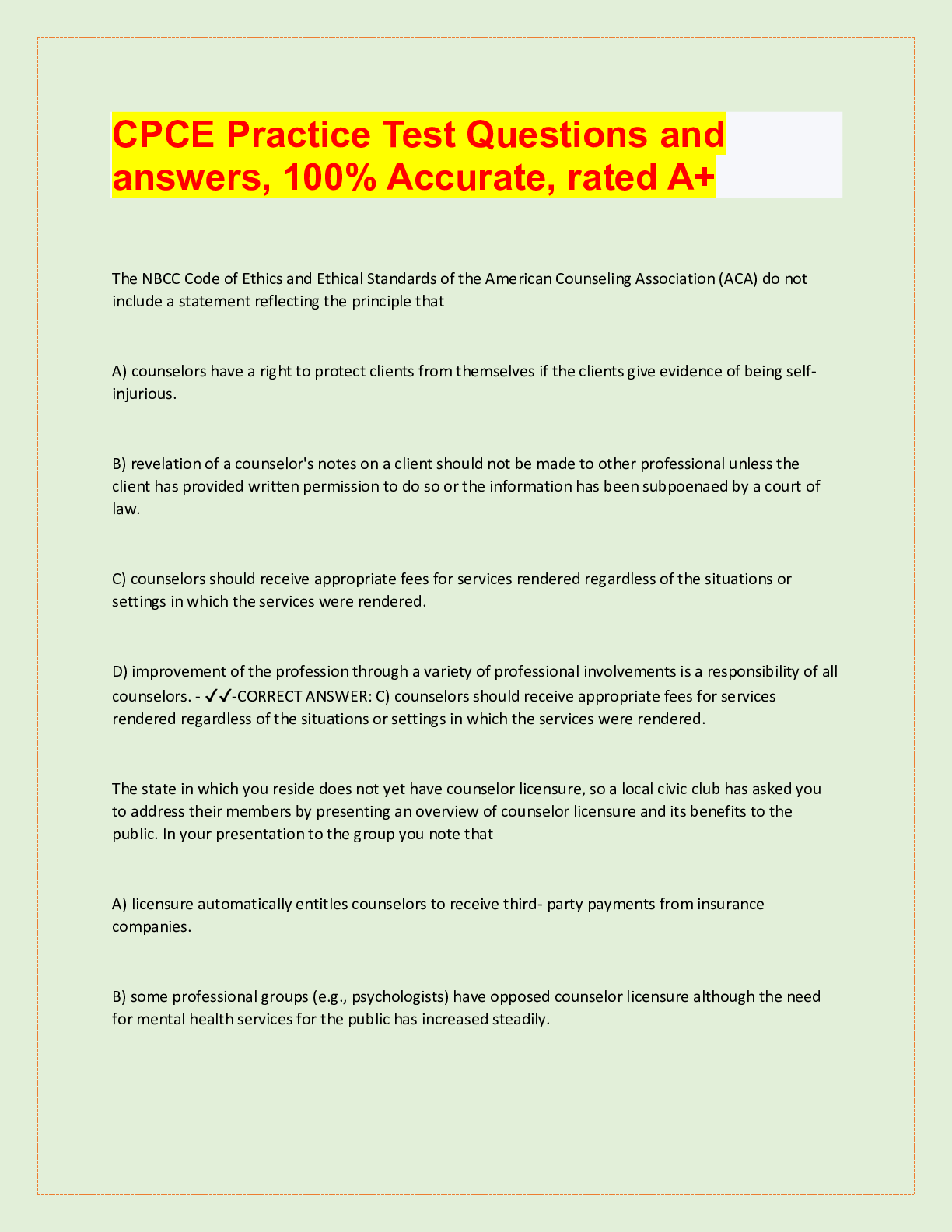
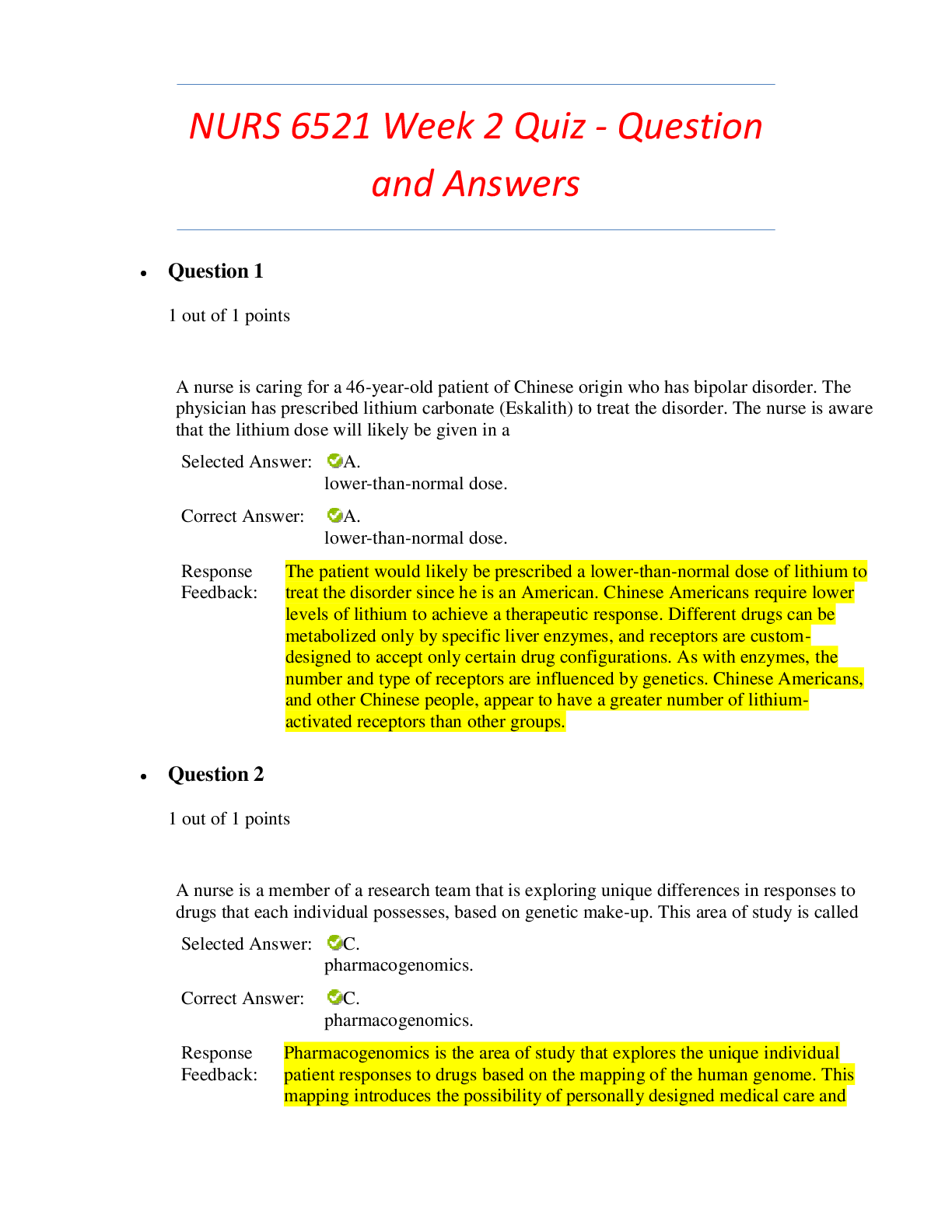
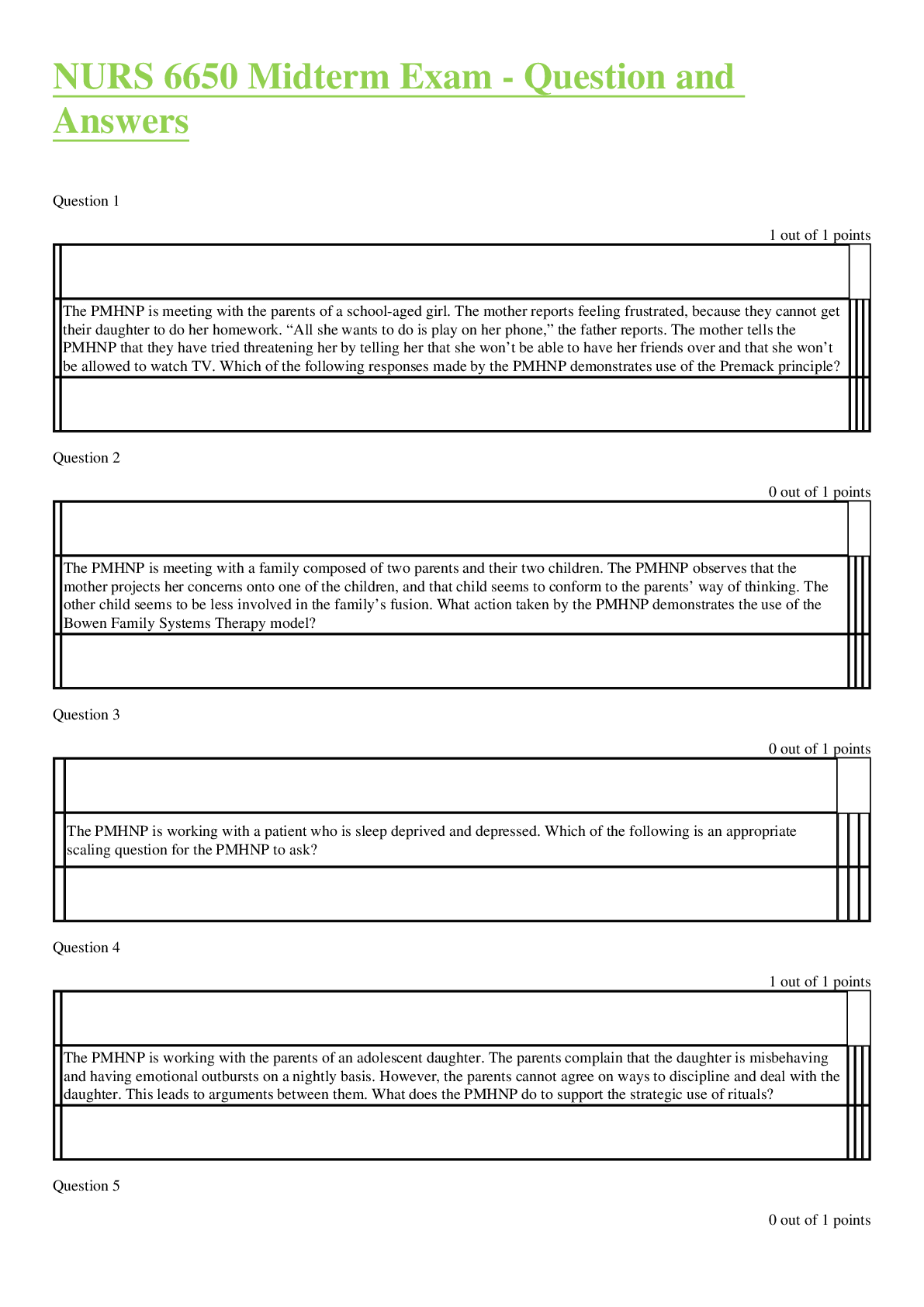
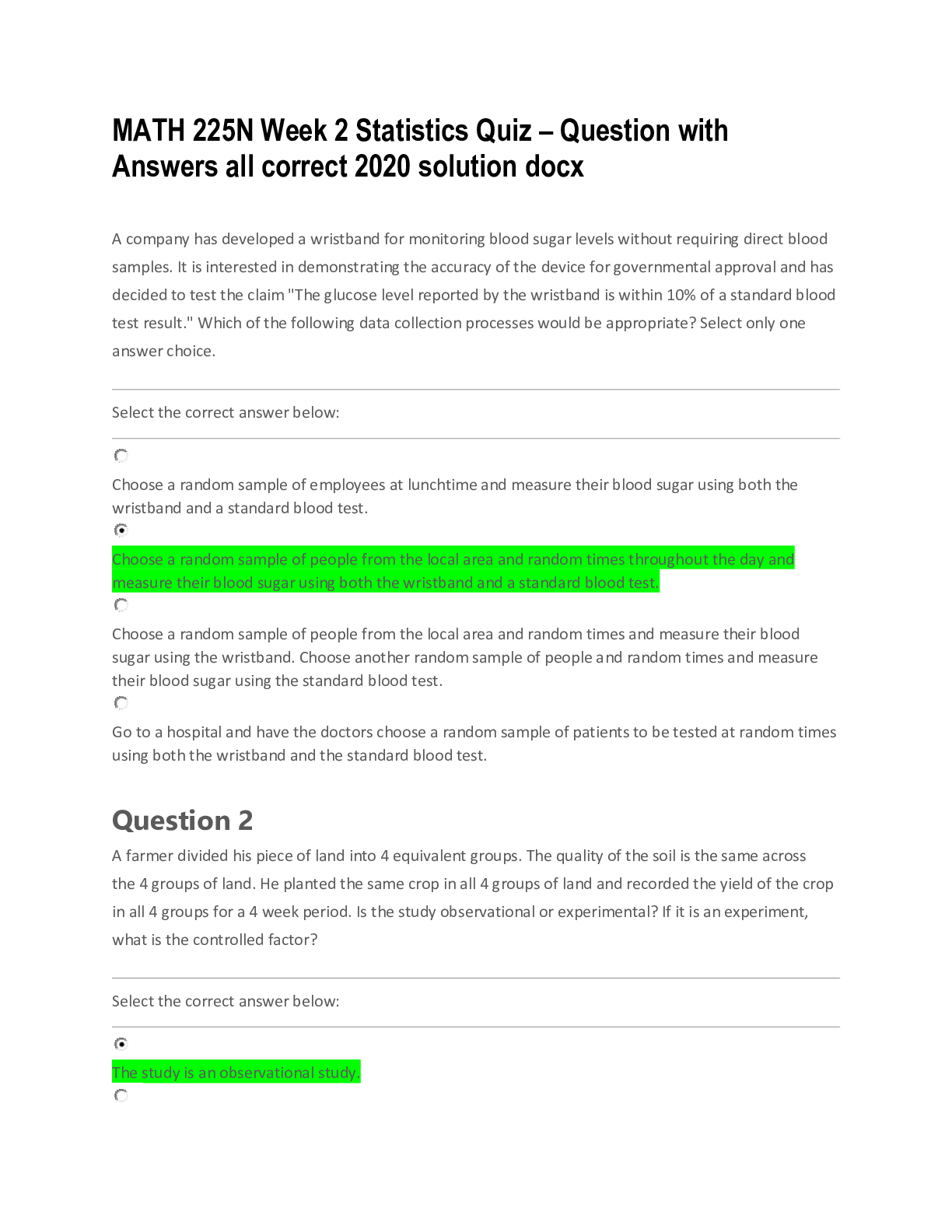
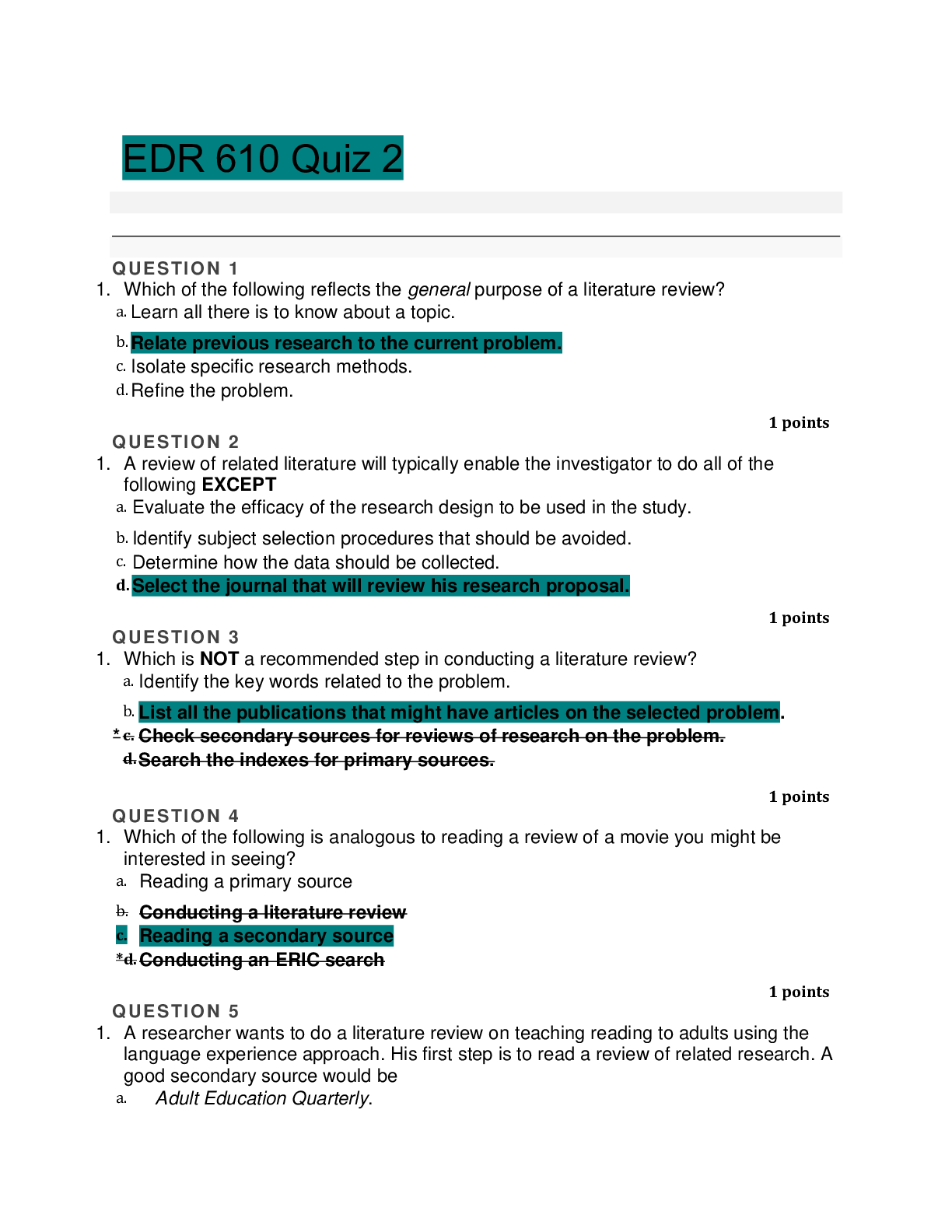
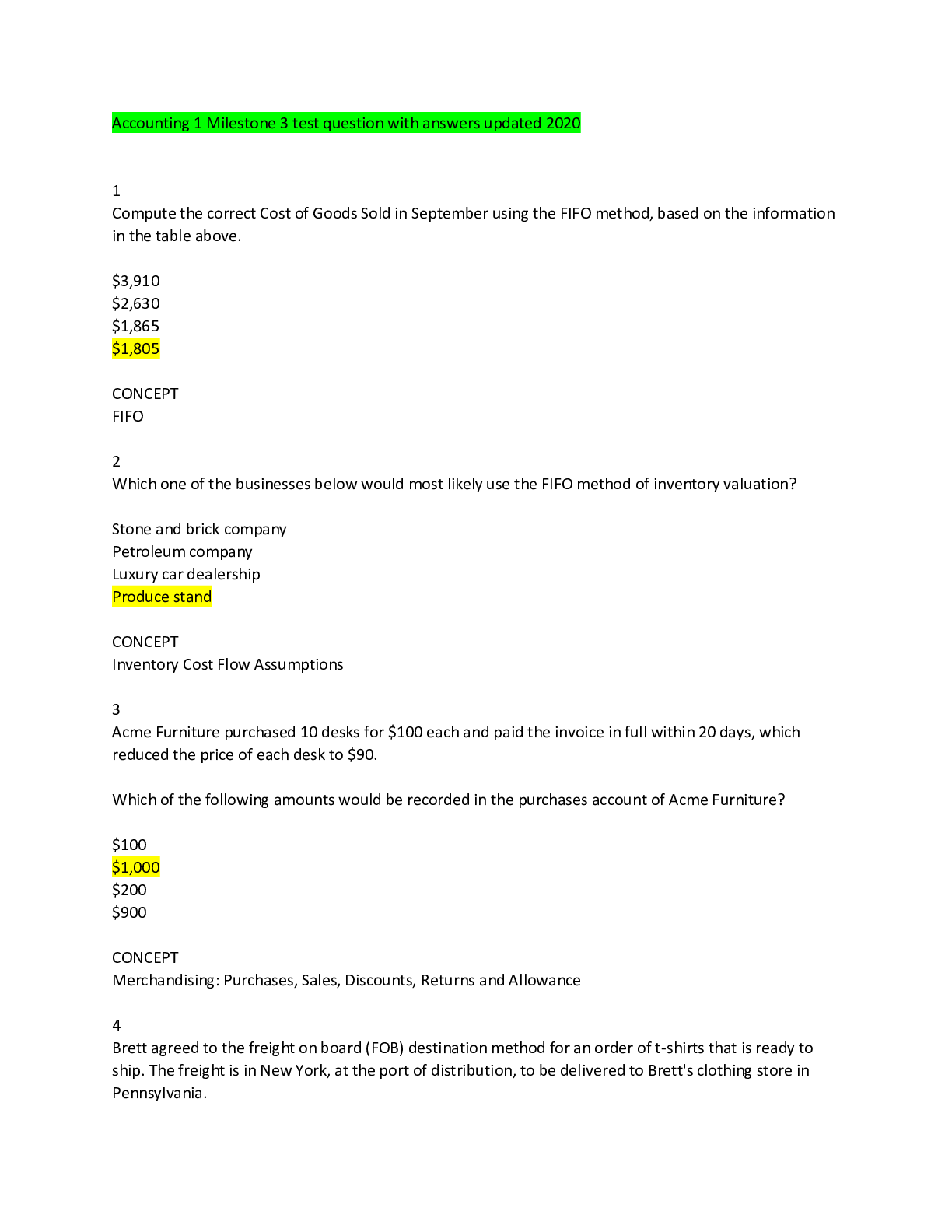
 ans.png)
